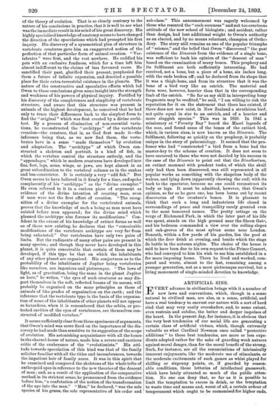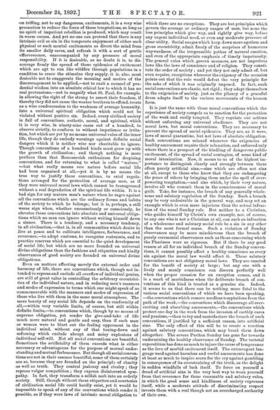ARTIFICIAL SINS.
EVERY advance in civilisation brings with it a number of
new laws and conventions, which, though in a sense natural to civilised man, are also, in a sense, artificial, and have a real tendency to encrust our nature with a sort of hard rind that may very easily overshadow, and, to some extent, even restrain and subdue, the better and deeper impulses of the heart. In the present day, for instance, it is obvious that the very best tendencies of our social life are generating a certain class of artificial virtues, which, though extremely valuable as what Cardinal Newman once called "protective additions" to those best tendencies, are more or less expe- dients adopted rather for the sake of guarding weak natures against moral danger, than for the moral benefit of the strong. Such, for instance, are all the renunciations of intrinsically innocent enjoyments, like the moderate use of stimulants, or the moderate excitements of such games as whist played for shilling or sixpenny points, or, if guarded by reason- able conditions, those lotteries of intellectual guesswork, which have lately attracted so much of the public atten- tion. No one can deny that, so far as it is possible to limit the temptation to excess in drink, or the temptation to waste time and means and, worst of all, a certain ardour of temperament which ought to be economised for higher ends,
on trifling, not to say dangerous, excitements, it is a very wise precaution to reduce the force of those temptations, so long as irio spirit of impatient rebellion is produced, which may result in worse excess. And yet no one can pretend that there is any intrinsic evil or sin in the temperate enjoyment of either such physical or such mental excitements as divert the mind from its smaller daily cares, and refresh it with a sort of gentle 'effervescence, unaccompanied by any pressure of moral responsibility. If it is desirable, as no doubt it is, to dis- courage firmly the spread of those epidemics of excitement which are apt to run like wildfire through populations in a condition to crave the stimulus they supply, it is, also, most desirable not to exaggerate the meaning and motive of the discouragement to be applied,—not to exalt a counsel of pru- dential wisdom into an absolute ethical law to which it has no real pretensions,—not to magnify what St. Paul, for example, in allowing the right of the strong to assert their freedom, if thereby they did not cause the weaker brethren to offend, treats as a wise condescension to the weakness of average humanity, into a universal spiritual obligation which could not be violated without positive sin. Indeed, every civilised society is full of conventions, msthetic, moral, and spiritual, which it is very wise, in ninety-nine cases out of a hundred, to observe strictly, to conform to without impatience or irrita- tion, but which are yet by no means universal rules of the inner life, though they do embody warnings against definite social .dangers which it is neither wise nor charitable to ignore. Though conventions of a hundred kinds must grow up with the growth of civilisation; and though nothing is more perilous than that Rousseauish enthusiasm for despising conventions, and for returning to what is called "nature," —but what really means raw nature before social life had been organised at all,—yet it is by no means the true way to justify these conventions, to extol regula- tions arranged for the protection of average men, as if -they were universal moral laws which cannot be transgressed without a real degradation of the spiritual life within. It is a bad sign for any mature man's nature when he rages against all the conventions which are the ordinary forms and habits of the society to which he belongs; but it is, perhaps, a still worse sign when, whether unconsciously or consciously, he elevates those conventions into absolute and universal obliga- tions which no man can ignore without writing himself down a sinner. There is a tendency, and a necessary tendency, in all civilisation,—that is, in all communities which desire to Eve at peace and to cultivate intelligence, forbearance, and reverence,—to adopt customs, to recognise restraints, and to practice reserves which are essential to the quiet development of social life, but which are no more founded on universal divine obligations than the fashions and etiquettes and kindly observances of good society are founded on universal divine obligations.
Even on matters affecting merely the external order and harmony of life, there are conventions which, though not in- tended to repress and exclude all overflow of individual genius, are still of great value in controlling the arbitrary eccentrici- ties of the individual nature, and in reducing men's manners and modes of expression to terms which one might speak of as -commensurable with the manners and modes of expression of those who live with them in the same moral atmosphere. The mere beauty of any social life depends on the conformity of all,—within very variable limits, of course, but still within definite limits,—to conventions which, though by no means of supreme obligation, yet render the give-and-take of life 'much more natural and gentle and easy, than if each man or woman were to blurt out the feeling uppermost in the individual mind, without any of that toning-down and softening which exclude abrupt and noisy explosions of individual self-will. Not all social conventions are beautiful. Sometimes the artificiality of them exceeds what is either necessary or advantageous for the purpose of mutual under- standing and mutual forbearance. But though all social conven- Cons are not in their essence beautiful, some of them certainly are so, because they are founded on the principle of charity as well as truth. They control jealousy and rivalry ; they repress vulgar competition ; they express disinterested sym- pathy. In fact, they transform a selfish mob into an orderly society. Still, though without these etiquettes and courtesies -of civilisation social life could hardly exist, yet it would be impossible to speak of any of the conventions which render it possible, as if they were laws of intrinsic moral obligation to which there are no exceptions. They are but principles which govern the average or ordinary usages of men, but none the less principles which give way, and rightly give way, before any urgent individual need, or even any moderate pressure of clear utility. Social usages which keep down mere egotism and gross eccentricity, admit freely of the surprises of humorous waywardness, of the irrepressible pathos of natural emotion, and even of the appropriate emphasis of timely impetuosity. The general rules which govern manners, are not imperious laws like the laws of conscience and of religion. They consti- tute the order of society ; and yet they not only admit of, but even require, exceptions wherever the exigency of the occasion points out that the rule would defeat the very principle for the sake of which it was originally imposed. In fact, such social conventions are elastic, not rigid ; they adapt themselves to the exigencies of society, just as the pliancy of a graceful dress adapts itself to the various movements of the human form.
It is just the same with those moral conventions which the experience of society compels us to sanction for the protection of the weak and easily tempted. They regulate our actions without enforcing any universal obedience. They are not moral laws, bat moral conventions. They are necessary to prevent the spread of social epidemics. They are, as it were, laws of moral quarantine, but not laws of absolute obligation. Such conventions are relaxed whenever the exigencies of healthy amusement require their relaxation, and enforced only where there is a prospect of the kindling of dangerous public excitement, of the spread of social contagion, of some kind of moral intoxication. Now, it seems to us of the highest im- portance to distinguish clearly and strongly between these often purely artificial sins,—sins which are often not sins at all, except to those who know that they are endangering the peace of others by bringing them under the spell of over- powering temptation,—and sins which, by their very nature, involve all who commit them in the consciousness of moral guilt. Take, for instance, the breach of any generally whole- some and salutary regulation of the Sunday. Such a breach may be very undesirable in the general way, and may set an example which is even more injurious than the actual infrac- tion of the usual Sunday rule. But neither to a Christian, who guides himself by Christ's own example, nor, of course, to any one who is not a Christian at all, can such an infraction of a wholesome and salutary social rule be a sin in any other than the most formal sense. Such a violation of Sunday observances may be more mischievous than the breach of purely ceremonial observances such as those concerning which the Pharisees were so rigorous. But if there be any good reason at all for an individual breach of the Sunday conven- tions, it cannot possibly affect a healthy conscience as every sin against the moral law would affect it. These salutary conventions are not obligatory moral laws. They are enacted for the benefit of society at large ; but any one with a lively and manly conscience can discern perfectly well when the proper occasion for an exception comes, and it is a mark of morbidness when the deliberate breach of con- ventions of this kind is treated as a genuine sin. Indeed, it seems to us that there can be nothing more fatal to the various social conventions of which we have been speaking, —the conventions which remove needless temptations from the path of the weak,—the conventions which discourage all over- exciting and absorbing amusements,—the conventions which protect one day in the week from the invasion of earthly cares and passions,—than to try and manufacture the breach of such conventions, if justified by a sufficient reason, into artificial sins. The only effect of this will be to create a reaction against salutary conventions, which may break them down altogether. The severe Puritan Sunday has gone far towards undermining the healthy observance of Sunday. The teetotal superstition has done as much to injure the cause of temperance as the love of morbid excitement itself. The extravagant lan- guage used against harmless and useful amusements has done at least as much to inspire scorn for the cry against gambling in consequence of its overstraining of the truth, as the delight in sudden windfalls of luck itself. To force on yourself a dread of artificial sins is the very best way to wean yourself from that reverence for those reasonable and salutary rules, in which the good sense and kindliness of society expresses itself, while a moderate attitude of discriminating respect invests them with a real though not an overcharged authority of their own.



































 Previous page
Previous page